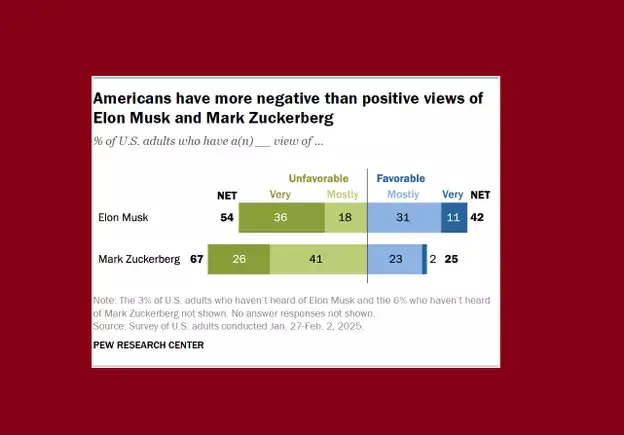Recent surveys conducted by Pew Research highlight a growing dissatisfaction among Americans regarding prominent tech figures, specifically Elon Musk and Mark Zuckerberg. In an age where technology drives much of societal interaction, the opinions of individuals at the helm of influential companies like X (formerly Twitter) and Meta can significantly impact public sentiment. The latest findings indicate that more than half of Americans hold an unfavorable view of Musk, with around 54% expressing discontent. Comparatively, Zuckerberg appears to attract even more negative sentiment, with studies revealing that two-thirds of the country view him unfavorably. This raises pertinent questions about the factors contributing to these declining approval ratings and the broader implications for the tech industry.
Both Musk and Zuckerberg have garnered extensive media attention over the years, but it’s their recent controversies that appear to solidify their images as polarizing figures. Musk has garnered criticism with his outspoken nature and decisions that many perceive as erratic. For instance, his tumultuous relationship with personal issues—most notably distancing himself from his daughter—has shocked observers. Additionally, his transformation of X into a platform largely dominated by his views has alienated both users and critics alike. His political endorsements and public commentary have frequently landed him at the center of controversy, further intensifying the divide among the populace regarding his character.
Zuckerberg’s challenges are equally notable. His business practices, particularly concerning user data privacy and the platform’s effects on mental health, have drawn ire and skepticism. Many individuals are deeply concerned about how Meta has profited from data exploitation, coupled with the platform’s alleged responsibility for facilitating harmful content aimed at young users. Furthermore, his ventures in land acquisition in Hawaii raised eyebrows and suggested a disconnect with everyday concerns faced by community members. As these two figures continue to dominate discussions surrounding social media, their contrasting controversies reflect their divergent approaches to power and influence.
The decline in public approval for Musk and Zuckerberg seems rooted in deeper societal concerns. Both men wield immense power, shaping narratives and influencing millions of lives through their platforms. Yet whatever ambition fuels their relentless pursuit of market dominance often clashes with the public’s desire for ethical leadership and corporate responsibility. The rampant spread of misinformation, privacy invasions, and general public disillusionment are byproducts of their actions that spark justified criticism.
It’s essential to acknowledge that both Musk and Zuckerberg navigate a rarefied atmosphere where their decisions carry heavy weight. Their ambitions drive technological advancements, but at what cost? The increasing calls for regulation indicate a society grappling with the consequences of unfettered capitalism in tech. Many believe these regulations, often seen as hindrances by billionaires, serve as necessary safeguards to protect the public interest, suggesting that a return to accountability is pivotal in navigating this tech-laden reality.
As public sentiment wavers, it raises the question: Can either Musk or Zuckerberg reclaim favorable views in the future? The answer may depend on their willingness to engage more positively with the communities they serve, acknowledge the consequences of their actions, and demonstrate genuine concern for the societal impact of their businesses. Transforming their narratives from self-serving business moguls to responsible leaders requires a substantial shift in both perception and action.
The time may come when they are remembered for their contributions to technology and society, but this transformation isn’t guaranteed. Continued scrutiny and demands for a balanced approach will determine whether they can pivot towards a path of greater accountability and constructive dialogue. Amid the complexities of technology and influence, both Musk and Zuckerberg have the potential to reshape their legacy—if they can reconcile the business of technology with the humanity it must serve.

